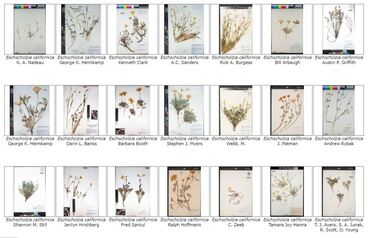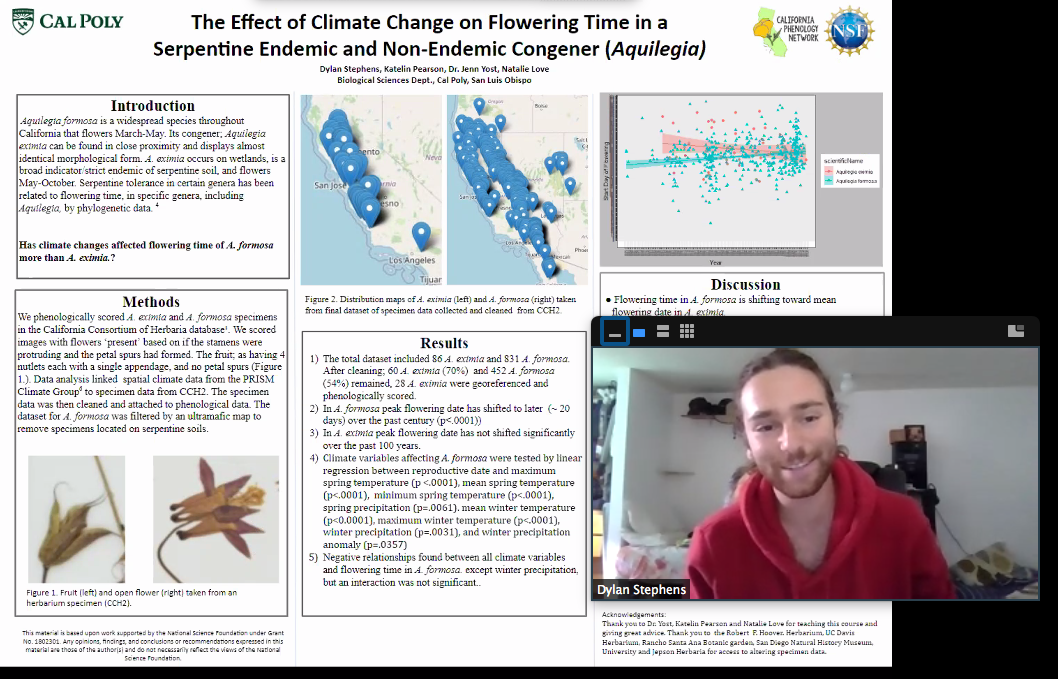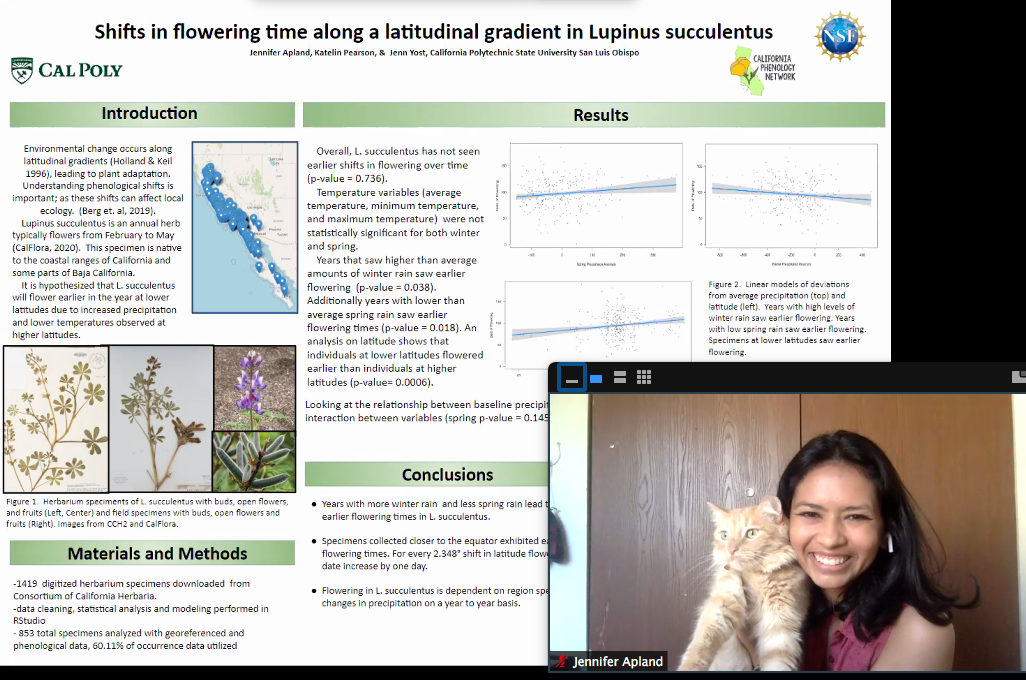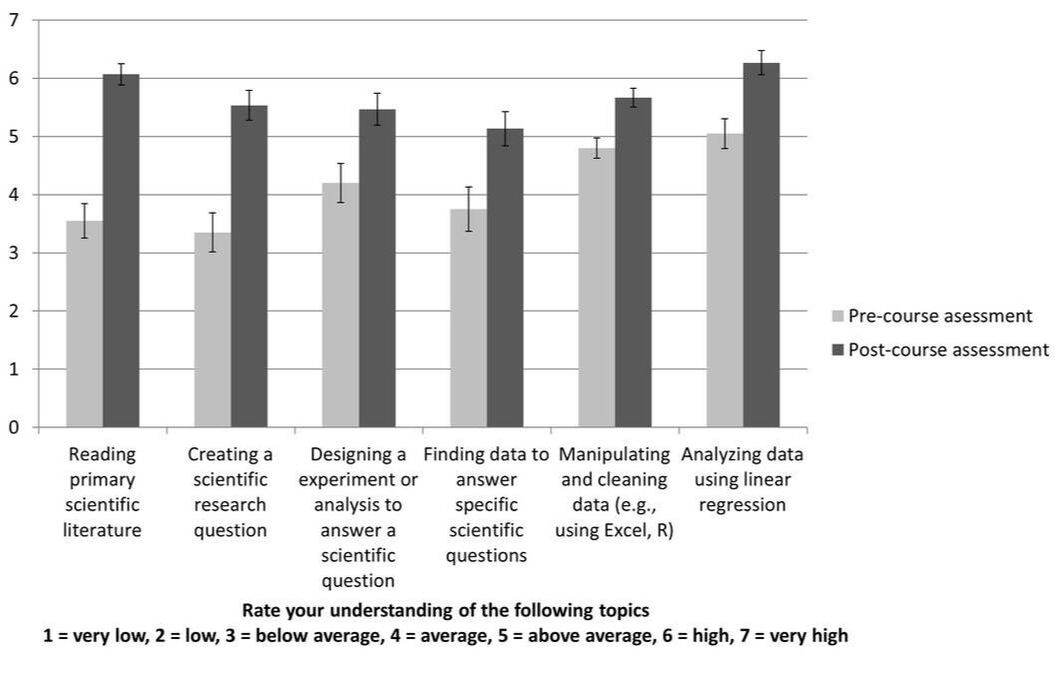Halfway into year 2 of the California Phenology Network project, we were faced with a dilemma. With thousands of herbarium specimen images being added to the CCH2 portal each week, the potential for uncovering new information about plant phenological events, such as climate-induced changes in flowering times, was also growing. How can we effectively harness these new data, given the wild diversity of our beautiful state? More still, how can we empower more scientists to do the same?
The CAP Network decided to start with the rising generation of scientists. Lead-PI Jenn Yost, project manager Katie Pearson, and two graduate students at UC Santa Barbara, Natalie Love and Tadeo Ramirez Parada, designed a 10-week course-based undergraduate research experience (CURE) that focused on using digitized herbarium data to study plant phenological change. Almost all the materials were created from the ground up, from assignments to the R code that students would use to analyze their data. After iterative development with four advanced students in the winter quarter, the course was ready for its pilot run at Cal Poly for the spring 2020 quarter. Little did we know that the commencement of the course would correspond with the shutdown of California due to Covid-19.
The course was quickly migrated online and shortened to nine weeks, yet registration numbers continued to climb to 19 students. On the first day of class, all nineteen students logged into Zoom, cameras on, eager to discuss the pre-course readings and delve into crafting scientific questions.
This being the first implementation of the course, there were many challenges, many owing to the use of R (a commonly used programming language in biological sciences) to clean the data and conduct analyses. Nevertheless, the students persisted. Each student drafted a research question and selected a study species or set of species by week 2, and over the following weeks learned to generate phenological and georeference data from images of herbarium specimens in CCH2; download, manipulate, and clean specimen data; analyze the data using linear regression in R; interpret their results; and design further analyses when needed. In the end, each student summarized their research in a scientific poster. On the last day of class, the students presented their posters, showcasing the trends they discovered. Most plant species they studied responded in one way or another to changes in climate.
Two students proudly display their research posters over Zoom on the last week of the phenology course
Despite setbacks due to the global pandemic, the newness of the course, and coding problems, the results of the course were overwhelmingly positive. Students remained engaged every class, and many started to solve code and analysis problems on their own. Even in the midst of seemingly endless troubleshooting, one student remarked:
| "This class is definitely the most fun and interesting coursework I’ve ever taken and I love it." - Cal Poly Student |
Results from a pre-course and post-course assessment, aimed at measuring learning outcomes, were also strongly positive. Students reported significant improvements in their understanding of key topics such as reading primary scientific literature and designing an experiment or analysis to answer a scientific question. Students also reported that they were now more comfortable practicing research skills like manipulating and cleaning data, analyzing data using linear regression, working with herbarium specimen data, and creating a scientific poster.
The course developers, with help from PIs Susan Mazer and Katja Seltmann, hope to improve the course over the summer and fall months with the goal of producing a more streamlined, universalizeable curriculum that can be adopted at other institutions. The course is scheduled to run again at Cal Poly during the winter quarter of 2021 and will hopefully spread across the state and beyond, building a network of students empowered with new data skills and scientific experience.
For more information about this course, visit our beta course page. As the course is developed, more content will be added to this page.
To read the Cal Poly Report article about this course, visit this page: https://www.calpoly.edu/news/botany-students-study-effects-climate-change-using-100-year-old-plants
To read the Cal Poly Report article about this course, visit this page: https://www.calpoly.edu/news/botany-students-study-effects-climate-change-using-100-year-old-plants




